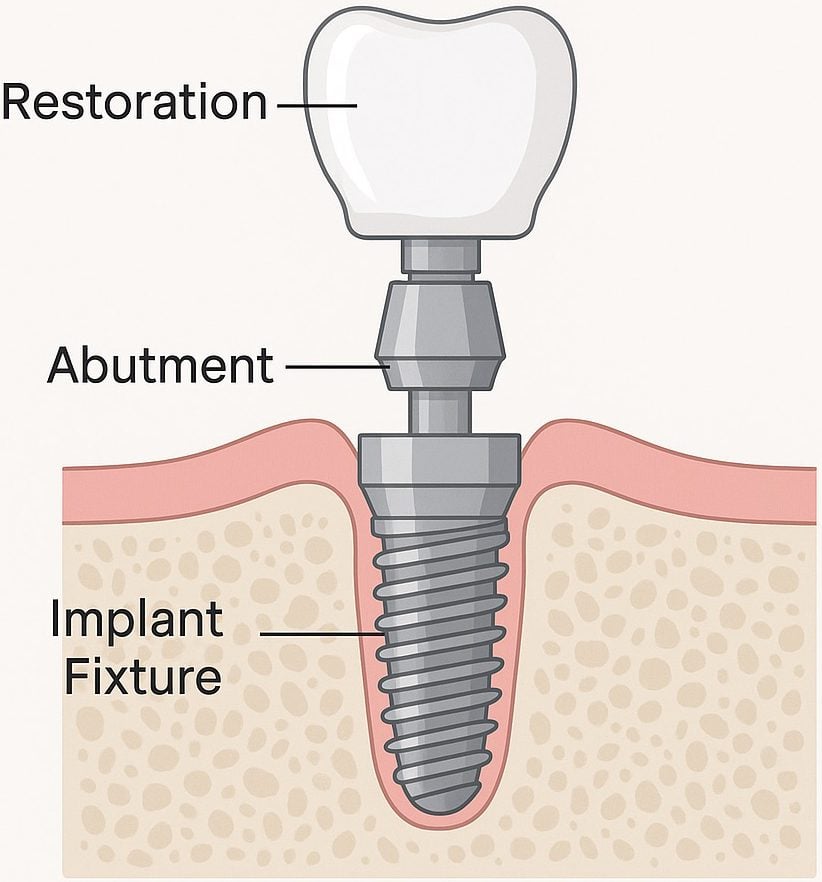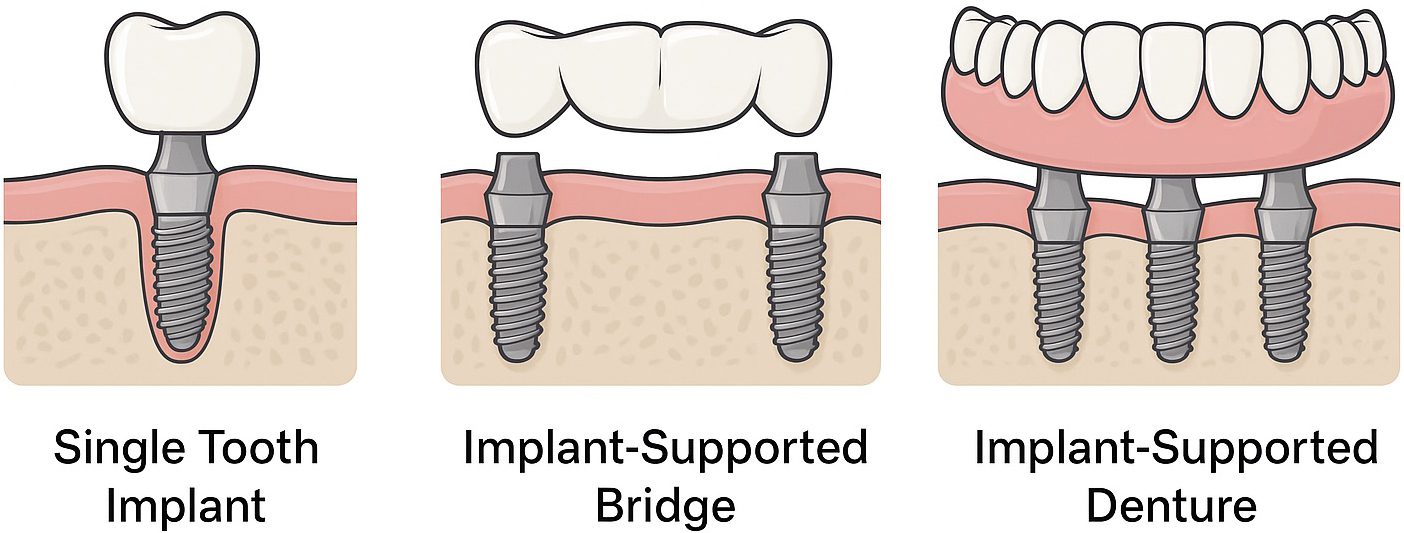Dental implants are a reliable tooth replacement option designed to restore missing teeth with a stable, natural-looking result. By replacing both the visible tooth and its root, implants help preserve bone structure, support oral function, and maintain the appearance of your smile.
Implants are often recommended when a tooth has been lost or extracted and you want a long-term solution that looks and feels like your natural teeth.
Summary: Dental implants are a safe, effective way to replace missing teeth, improve chewing and speech, and prevent bone loss. This treatment supports your long-term oral health and confidence.
We provide single tooth implants, implant-supported bridges, and full arch dental implants at our dental office in Boulder, CO.
What Are Dental Implants?
Dental implants are small titanium alloy posts that act as artificial tooth roots to replace missing teeth.
They are surgically placed into the jawbone, where they integrate with the bone to create a secure foundation for replacement teeth. Unlike removable dentures and bridges, implants are permanent and function like natural teeth.
A complete dental implant has three parts:
- Implant fixture: A small titanium screw placed into the jawbone to act as the new tooth root.
- Abutment: A connector attached to the implant after healing to hold the final restoration.
- Restoration: A custom-made dental crown, bridge, or denture that completes your smile.

Illustration showing the three parts of a dental implant: the implant fixture placed in the jawbone, the abutment connector, and the crown restoration that completes the tooth.
Dental implants are a long-term solution that can restore:
- Chewing and speech function
- Facial symmetry and natural contours
- Overall dental health by preventing bone loss
While we place the majority of our dental implants in-house, we work closely with a trusted oral surgeon for more complex cases, such as full arch restorations. No matter where your surgery is performed, you will receive expert implant restoration and personalized follow-up care.
Types of Dental Implant Restorations
Depending on how many teeth you are missing, different implant-supported options can be used to rebuild your smile.
Single Tooth Implants
A single dental implant replaces one missing tooth with a custom crown. This option restores normal chewing, protects neighboring teeth, and blends naturally with your other teeth.
Implant-Supported Bridges
If you are missing several teeth in a row, an implant-supported bridge uses two or more implants to anchor a custom bridge securely in place. This helps maintain bone density, prevents teeth from shifting, and provides a stable, natural-looking result.
Implant-Supported Dentures
For patients missing most or all teeth in an arch, implant-supported dentures provide a secure alternative to traditional removable dentures. They are anchored with multiple implants and designed to improve chewing, speech, and overall comfort.

Illustration of three types of dental implant restorations: a single implant replacing one tooth, an implant-supported bridge replacing multiple teeth, and an implant-supported denture securing a full arch of teeth.
Who Is a Candidate for Dental Implants?
Successful dental implants depend on a combination of health factors and personal commitment. You may be considered a candidate if you meet the following criteria:
- Missing one or more teeth
- Free of active infection or untreated gum disease
- Have adequate bone volume or are willing to consider bone grafting
- Do not smoke or are willing to stop during healing
- Are prepared to maintain good daily oral hygiene and attend follow-up appointments
During your consultation, we will review your medical history, assess your oral health, and create a plan that supports lasting results.
Are Dental Implants Right for You? Dental implants can transform your smile, but they also require a commitment to your health. Ask yourself: Are you ready to maintain excellent daily oral hygiene, visit the dentist regularly, and avoid habits like smoking that can compromise healing? Staying dedicated to these habits gives your implant the best chance for long-term success.
Step-by-Step Dental Implant Placement
While each patient’s treatment is unique, here is what you can typically expect from the dental implant process:
1. Consultation and Imaging
We begin with a complete dental exam, including 3D CBCT imaging to assess bone density and structure. We will discuss your goals, medical history, and suitability for implant dentistry.
2. Extraction and Bone Grafting (if needed)
If a tooth needs to be removed, we may perform the extraction first. In many cases, dental bone grafting is recommended to preserve or rebuild the jawbone, ensuring a stable foundation for the implant.
3. Implant Placement
Under anesthesia or other sedation options, the titanium screw is precisely placed into the bone. A healing cap may be applied to protect the site.
4. Healing Period
It typically takes 3–6 months for the implant to integrate securely with the jawbone in a process called osseointegration. In the first few weeks after placement, the gum tissue heals around the implant site. Most patients experience mild soreness or swelling that improves within several days, while the deeper bone integration continues over the following months.
5. Abutment and Crown Placement
Once healed, a titanium post (abutment) is placed, followed by a permanent dental crown that is color-matched to your natural teeth.
What to Expect After Dental Implant Surgery
Proper care after implant placement helps reduce discomfort, prevent complications, and ensure successful healing.
Detailed post-surgery instructions will also be provided before you leave our office. Following these guidelines will support both soft tissue recovery and long-term stability of your implant. Here is what you can expect during each stage of healing.
First 24–48 Hours
You may notice mild bleeding, swelling, or soreness during the first day or two.
- Stick to soft, cool foods like yogurt, smoothies, and applesauce.
- Avoid touching the surgical site or using a straw.
- Use gauze if minor bleeding occurs.
- Take prescribed or over-the-counter pain relief as directed.
Day 3–7
Swelling should begin to improve, and discomfort typically decreases.
- Rinse gently with saltwater after meals.
- Resume gentle brushing around the area with a soft-bristled brush.
- Gradually reintroduce soft, warm foods such as mashed potatoes, eggs, and cooked vegetables.
Week 2 and Beyond
The area will continue to strengthen and become more comfortable as the bone heals.
- Avoid crunchy or sticky foods near the area until fully healed.
- Attend all scheduled follow-ups to monitor healing and prepare for the crown placement.
- Maintain excellent oral hygiene and avoid tobacco to support long-term success.
Cost of Dental Implants in Boulder, CO
The cost of dental implants varies depending on factors such as the number of implants, the need for bone grafting, and the type of restoration.
For many patients, the cost of a single implant—including the consultation, surgery, implant crown, and follow-up visits—starts around $6,000. Additional procedures like extractions and bone grafting can increase the total cost.
We believe in transparent pricing and will provide a detailed treatment plan with a clear estimate after your consultation. Our office is in-network with Delta Dental Premier, Cigna DPPO Plus, Anthem, and Blue Cross Blue Shield, and we are happy to work with out-of-network benefits as well.
Supporting Your Smile with Dental Implants
Choosing to replace a missing tooth is an important decision that can improve your health and daily life. Dental implants help maintain bone structure, keep your bite aligned, and restore natural function and appearance. Our team will guide you through each step with honest recommendations and attentive care, so you feel confident in your treatment plan.
Key Takeaway: Dental implants offer a lasting way to replace missing teeth, protect your oral health, and restore the stability of your smile.
Insurance and Membership Options
We are in-network with Delta Dental Premier, Cigna DPPO Plus, Anthem, and Blue Cross Blue Shield. We also accept out-of-network benefits and offer a dental membership plan for patients without insurance.
We proudly serve Boulder and the surrounding communities of Superior, Louisville, Lafayette, Longmont and Erie.
To book an appointment at our dental office in Boulder, CO, call (303) 442-6141 or visit us at 777 29th St, Unit 300 Boulder, CO 80303.
FAQs
How long do dental implants last?
With proper care, dental implants are designed to last for decades. While the implant itself can often remain in place for life, the crown or bridge attached to it may need periodic replacement due to normal wear.
Does implant surgery hurt?
Implant placement is generally well tolerated. The area will be completely numbed with local anesthesia, and sedation is available if you feel anxious. Most people describe feeling pressure rather than pain during the procedure and only mild discomfort afterward.
Can I get implants if I have bone loss?
Even if you have experienced bone loss, dental implants may still be possible. Bone grafting can often rebuild the jawbone to allow for stable implant placement. We will determine whether grafting is needed based on detailed imaging and examination.
Are dental implants better than bridges or dentures?
Dental implants have several advantages over bridges or dentures. They help maintain bone health, do not rely on adjacent teeth for support, and often look and feel more like natural teeth. However, the best option depends on your specific needs, oral health, and budget.
How do I care for my implant?
Caring for an implant is similar to caring for natural teeth. Brush and floss daily, use any recommended tools to clean around the implant, and keep up with regular dental check-ups. Avoid smoking, as it can interfere with healing and long-term success.
What can I eat after dental implant surgery?
For the first few days, stick to soft, cool foods like yogurt, smoothies, applesauce, and mashed potatoes. Avoid hot, crunchy, or sticky foods that could irritate the area. As healing progresses, you can gradually reintroduce soft, warm foods and eventually return to your normal diet when your dentist advises it is safe.
